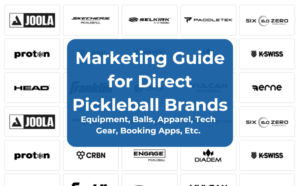
These days, your domain name does more than just represent your online address—it shapes how you’re perceived, what you do, and how you stand out. This seemingly simple choice can influence how welcoming your website appears to curious visitors.
With the digital landscape becoming more competitive every day, obtaining a favorable domain name and enhancing website SEO have become stiff competition. In fact, SEO spending reached a staggering $80 billion globally in 2021.
Now the most frequently asked question is: is the domain name a factor affecting (SEP) Google’s ranking?
Is Domain Name a Ranking Factor?
Having a domain name that exactly matches the topic used to be very important.
Back in 2010, the domain CarInsurance.com was sold for a whopping $49.7 million, which remains the highest price ever paid for a domain name. This shows that some people saw a lot of value in domain names with specific keywords.
In the past (and sometimes even now), many folks in the SEO industry recommended using Exact Match Domains (EMDs). The idea behind this was that EMDs were believed to instantly make a website look trustworthy and give it a competitive advantage.
Well, Google eventually caught on to their trick of overloading URLs with keywords, and it changed its algorithm to not give them as much credit. Still, this doesn’t mean that your website’s domain name has no impact on SEO.
Does Your Domain Name Impact SEO?
Keywords are not the only factor that matters for SEO when it comes to domain names. When choosing a domain name, it’s important to consider how well it represents your brand, business, and what you provide. An SEO-optimized domain name is one that is not only relevant but also carries your brand identity and effectively communicates the website’s purpose and content.
To begin with, having keywords in your domain name is not a necessity for achieving a high ranking in search results. Search engines are well aware of the practice of stuffing keywords into domain names, and they actively discourage the use of exact match domains (EMDs) created solely for this purpose.
Instead of being obsessed with keywords, your focus should be on creating a domain name that aligns with your brand and suits your business offerings. Establishing a consistent and recognizable brand presence online will naturally complement your SEO endeavors.
While your domain name plays a role in your website, its significance is relatively small compared to the 200 other ranking factors that Google considers when determining your site’s position in search results.
If So, How Does the Domain Name Affect SEO?
Although domain names are not the primary factor in SEO, they can still significantly influence it. Using a domain name that combines relevant and branded words to create a concise, appealing name can greatly enhance your chances of achieving a good search engine ranking. However, it’s crucial to avoid using exact-match keywords excessively, as this can make your site appear spammy and harm your ranking potential. Finding the right balance is key.
When focusing solely on a website’s domain name, it’s clear that incorporating appropriate keywords can indeed boost your chances of ranking well in search engines. Nevertheless, this doesn’t guarantee that exact-match domains will always come out on top.
Consider, for instance, service-based businesses in Paris. Many of the top-ranking websites include “Paris” and the relevant service keyword in their domain names. The secret lies in their ability to choose domain names that are not only relevant and optimized but also centered around their brand. These names work in conjunction with other search ranking factors to secure a favorable position.
In fact, opting for a domain name that’s both fitting and relevant can help target your intended audience and expedite your search ranking progress. However, it’s important to remember that domain names aren’t the sole factor; your website must also be well-optimized for your chosen domain name to truly benefit you.
Steps for Picking an SEO-friendly Domain Name
Selecting an effective SEO domain name involves paying attention to keywords, opting for shorter lengths, and emphasizing simplicity or abbreviations. While instant Google front-page placement might not happen, adhering to these practices from the start will lay a strong foundation for your domain and lead to substantial benefits over time.
Here are four practical tips for picking a search engine-optimized domain name:
1. Choose the right keywords
Today, domains don’t necessarily require full keywords to gain search engine advantages. Yet, including a relevant concept or two in the domain name can enhance clarity about your brand.
Take the example of an EV car brand Lexell (an imaginary brand name), which uses a keyword in its domain name, lexellevcars.com. This inclusion of “EV Cars” complements the brand Lexell, establishing expectations and aiding searchers in finding what they seek.
Remember, a strong domain name doesn’t have to solely revolve around keywords. Opt for a domain name with one or two keywords, or describe your brand’s essence with a concise acronym.
2. Choose a short domain name
The length of your domain name doesn’t directly influence its ranking on search engines, especially Google. However, it does play a vital role in how easily customers can remember it.
Studies show that the average domain name is about 13 characters in length. Among the top 500 most visited websites globally, this average shrinks even further to just seven characters. Regardless, it’s important to choose a domain name that is memorable without becoming too complex. Keep in mind that shorter domain names tend to hold greater value.
3. Opt for a simple domain name
Research at Wharton showed that straightforward and simple naming approaches were the most effective. The following are some of the research findings:
- Beyond the seventh character in a domain name, there’s a 2% reduction in website traffic.
- Using domain names without hyphens helps avoid traffic penalties by keeping things less complex.
- Repeating vowel or consonant sounds in domain names correlates with lower rankings.
The takeaway? The simpler your domain name is, the more successful it’s likely to be in terms of performance.
4. Pick a trustworthy domain extension
There’s no doubt that the .com top-level domain (TLD) is highly sought after. It currently holds the title of the most respected domain extension worldwide and is 33% more memorable than any other TLD. While using .com alone won’t directly boost your search engine ranking, it can enhance your credibility in the eyes of customers, which in turn can naturally improve your rankings.
However, not having access to a .com domain doesn’t mean all hope is lost. Extensions like .co and .net are still gaining the trust of audiences. Even the new .AI extension is now well perceived. However, it’s advisable to steer clear of uncommon generic top-level domains (gTLDs) such as .moda and .olayan, and other unfamiliar terms in the market. These extensions might not be as recognizable or trusted.
Do a competitor domain name SEO analysis
Before finalizing the purchase of an SEO-friendly domain name, it’s a smart move to examine the domain names used by your main competitors. Analyzing competitor domain names provides valuable insights into their positioning, ranking, and perception in the market. This analysis can guide your decision-making process when acquiring a domain name.
Unlike comprehensive site audits or content evaluations, conducting a competitor SEO analysis involves asking straightforward questions. These questions help you understand your competitors’ choices in domain naming and how those choices have potentially influenced their online rankings.
The insights gained from this analysis can then be used to select domain keywords, phrases, generic top-level domains (gTLDs), and lengths that outshine those of your competitors.
Here are some questions to consider:
- How easy to remember and brandable is the domain name? Does it stay under the recommended 14-character maximum?
- Is the domain considered authoritative and how well does it align with their branding?
- Think about the differences of the domain. Does the company own domains with similar gTLDs to prevent copcycats (e.g., bestcookies.com, bestcookies.net, bestcookies.biz)?
Final takeaways
All in all, your chosen domain name is more than just a web address; it represents your identity, purpose, and what visitors expect. While its direct influence on SEO ranking is complex, it’s best to choose a short, memorable, and relevant name that aligns with your brand name.
Keep in mind that the search engine algorithm, such as the Google algorithm, takes many factors into account, so a user-friendly domain name is just a part of the whole picture. Ultimately, your success online depends on creating engaging website content, smooth website user experience, and other factors such as marketing, customer service, response time, etc.



